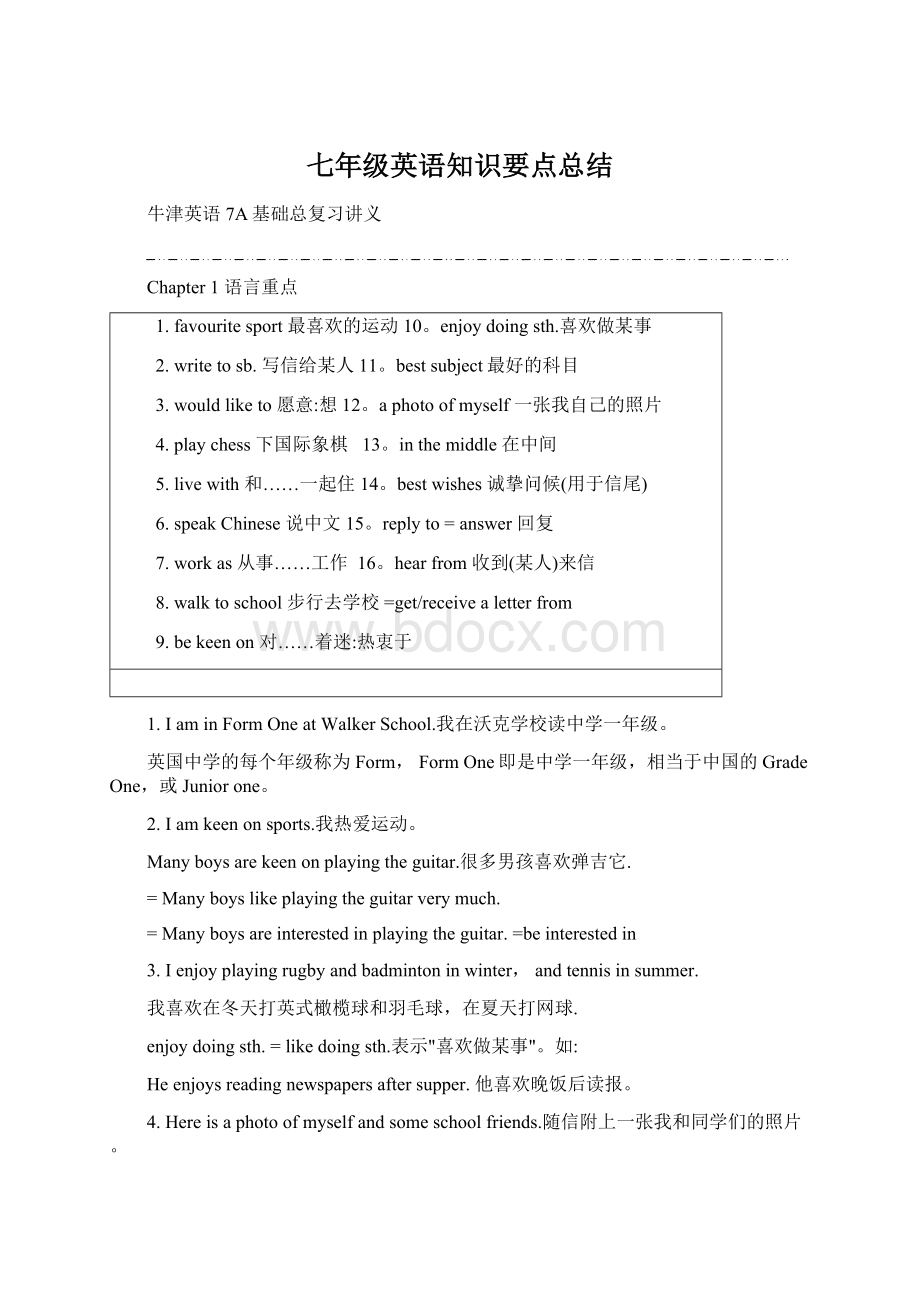七年级英语知识要点总结.docx
《七年级英语知识要点总结.docx》由会员分享,可在线阅读,更多相关《七年级英语知识要点总结.docx(20页珍藏版)》请在冰豆网上搜索。

七年级英语知识要点总结
牛津英语7A基础总复习讲义
Chapter1语言重点
1.favouritesport最喜欢的运动10。
enjoydoingsth.喜欢做某事
2.writetosb.写信给某人11。
bestsubject最好的科目
3.wouldliketo愿意:
想12。
aphotoofmyself一张我自己的照片
4.playchess下国际象棋13。
inthemiddle在中间
5.livewith和……一起住14。
bestwishes诚挚问候(用于信尾)
6.speakChinese说中文15。
replyto=answer回复
7.workas从事……工作16。
hearfrom收到(某人)来信
8.walktoschool步行去学校=get/receivealetterfrom
9.bekeenon对……着迷:
热衷于
1.IaminFormOneatWalkerSchool.我在沃克学校读中学一年级。
英国中学的每个年级称为Form,FormOne即是中学一年级,相当于中国的GradeOne,或Juniorone。
2.Iamkeenonsports.我热爱运动。
Manyboysarekeenonplayingtheguitar.很多男孩喜欢弹吉它.
=Manyboyslikeplayingtheguitarverymuch.
=Manyboysareinterestedinplayingtheguitar.=beinterestedin
3.Ienjoyplayingrugbyandbadmintoninwinter,andtennisinsummer.
我喜欢在冬天打英式橄榄球和羽毛球,在夏天打网球.
enjoydoingsth.=likedoingsth.表示"喜欢做某事"。
如:
Heenjoysreadingnewspapersaftersupper.他喜欢晚饭后读报。
4.Hereisaphotoofmyselfandsomeschoolfriends.随信附上一张我和同学们的照片。
aphotoofmyself=aphotoofme是指"一张有我本人的照片",强调的是"我在照片里"。
Questionswithquestionwords.(带特殊疑问词的特殊疑问句)
(1)what"什么"
Whatisyourname?
MynameisSimon.Whatisyourjob?
Iamanengineer.
(2)where"在哪里;到哪里"
Wheredoyoulive?
IliveinShenzhen
(3)when"什么时候"
WhenwillyougotoAustralia?
Iwillgotherethedayaftertomorrow.
(4)who(主格)"谁"Whoisyourfavouritefilmstar?
(5)whose"谁的"Whosecaristhis?
ItisTim’s.
(6)which"哪一个"Whichmagazineisyours?
Thenewoneismine.
(7)why"为什么",必须用because回答。
Whywereyoulatethismorning?
BecauseImissedthebus.
(8)how"怎么,怎样"
Howareyou?
Iamverywell,thankyou.
HowdoesSimonoftengotoschool?
Heoftengoestoschoolonfoot.
(9)howold"多大岁数"
Howoldareyou?
I'mtwelveyearsold.
(10)howmany+可数名词"多少"
Howmanypeoplearethereinyourfamily?
Therearethree.
(11)howmuch十不可数名词"多少"或"多少钱"Howmuchmilkisthereinthebottle?
Thereisalittle.Howmuchisthemeal?
Itistwohundredyuan.
(12)howlong"多长时间"
Howlongdoesittakeyoutodoyourhomeworkeveryday?
Abouttwohours.Howlong问,答for,about
(13)howoften"多久......一次",指频率。
Howoftendoyouwritetoyourpenfriend?
Twiceamonth
(14)howsoon"多快",指时间。
Howsoonwillyourfathercomeback?
Intwohours.
(15)howfar"多远",指距离。
Howfarisitfromyourhousetoyourschool?
Abouttwomiles.
不定冠词a和an
(a用于以辅音音素开头的单词前,an用于以元音音素开头的单数单词前,不是字母。
adentistamagazineanarchitectanengineerahorseahospital
第二行的四个单词虽然都以字母h开头,但house和hospital中的h都发/h/音,音素为辅音,所以不定冠词要用a;
而hour和honest中的h都不发音,所以它们的首音素为元音,不定冠词要用an。
Ihaveanorange.Theorangeisonthetable.Thegirlwantstobeanactress.
Conjunctions:
and,butandso(连词and,but和so)
(1)and"和",表示并列。
Shehasasonandadaughter.
(2)but"但是",表示转折。
Hehasmuchmoney,butheisnothappyatall.
写信的格式:
(1)信内一般会写上寄信人的地址。
在写地址的时候,要注意:
从小写到大。
这和中文信地址的写法刚好相反。
(2)写信日期也与中文不同,英文信的日期一般写在寄信人地址之下,中文信一般写在信的末尾。
(3)英文信中,常常用Dear作为问候。
如正式信函,一般用DearMr.Smith/DearMissWang等;如无法分辨男女,则用DearSir/Madam;如是朋友,往往直接在Dear后加名字,如DearKitty/DearSimon等。
(4)信的正文往往占据了很大篇幅。
一般信的开头要稍加问候,信的末尾也要问候收信人,并期待收到对方的来信。
如:
"Bestwishes!
""Lookingforwardtoyourletter."
(5)结尾还要写上"敬语",如Yours'sincerely或Vurstnlly(比较正式、庄重)、Yourslove(比较随意,用于亲人、朋友之间)、Yours等。
(6)信的末端还要签名。
如是打印的信件,在打上自己的名字后,还要有亲笔签名。
Chapter2语言重点
1.bestillatschool仍旧在上学11.abouttwiceaweek大约一周两次
2.getup起床12.returntoschool返回学校
3.putonschooluniform穿上校服13.afterschool放学后
4.discussbusiness讨论生意14.attendaclub参加俱乐部
5.atbreakfast在吃早餐的时15.asksb.todosth.要求某人做某z
6.makephonecallsto打电话给某人16.assistsb.帮助某人
7.onthewaytoschool在去学校的路上17.continuedoingsth.继续做某事
8.achieveAgrades获得A等18.loseone'stemper发脾气
9.failanexam考试不及格
10.collectsb.fromschool从学校接某人
1.WendyWang,15,isoneofthetopstudentsinShenzhen十五岁的王温迪是深圳尖子生之一。
topstudent=excellentstudent=beststudent尖子生:
优秀学生oneof+名词复数……之一
LiuXiangisoneofthetoprunnersintheworldnow.刘翔是世界上顶尖的跑步运动员之一。
2.Igetupatsixo'clock,washandputonmyschooluniform.我六点起床,洗漱后穿上校服。
puton与wear的区别:
puton表示"穿"的动作,而wear表示"穿着"的状态。
Mary,putonyourcoat.It'scoldoutside.玛丽,穿上你的大衣。
外面很冷。
Maryiswearingaredcoat.玛丽正穿着件红大衣。
反义词:
takeoff
3.Ihavebreakfastwithmyparents.我和父母一起吃早餐。
havebreakfast/havelunch/havedinner(supper)(中间不用冠词)
4.Everymorning,wediscussbusinessatbreakfast.每天早上我们在吃早餐时讨论生意。
=Everymorningwetalkaboutbusinesswhenhavingbreakfast.
discuss=talkabout讨论
5.Isometimesmakephonecallstoclientsonthewaytoschool.有时在上学路上我会和客户通电话。
=Isometimescallmyclientsonthewaytoschool.
makephonecallstosb.=callsb./phonesb.给某人打电话
onthewaytoschool在上学路上onthewaytowork在上班路上
注意:
onthewayhome在回家的路上(home是副词,前面要省略to)
onthewayhere/there在来这里/去那里的路上(here/there是副词,前面要省略to)
6.IusuallyachieveAgradesinallmysubjects.我的各科成绩通常都是A等。
achieve=get/receive获得
Youhaveachievedthesuccessyouwant.你己获得你想要的成功。
7.Abouttwiceaweekmydrivercollectsmefromschool.大约一周两次,司机会到学校接我。
1collectmefromschool=pickmeupfromschool从学校接我(collect志为"接走")collectsb=picksbup
②Hishobbyiscollectingstamps.他的爱好是收集邮票。
(collect意为"收集")
8.Afterschool,Iusuallyattendaclub.放学后我通常会参加兴趣小组的活动。
attend=goto出席,参加
9.Otherstudentsoftenaskmetoassistthem.其他同学经常请我帮他们。
=Otherstudentsoftenaskmetohelpthem.
Weshouldassistthosepeoplewhoneedhelp.我们应该帮助那些需要帮助的人。
10.ThenIgotomyofficeandcontinueworkingonmygames.然后我回我的办公室继续编写游戏。
continuedoingsth.=goondoingsth继续做…
Thesimplepresenttense(一般现在时)
一般现在时用来表示现在的状态、经常的或习惯性的动作、真理、基本事实或常见现象等。
与一般现在时连用的时间状语有:
often,always,sometimes,usually,everyday/week/year等。
2.一般现在时的构成:
①肯定句:
(注意:
第三人称单数的行为动词后要加s)
I/You/We/They
live
inShenzhen.
He/She/It
lives
Igetupatseveneveryday.我每天七点起床。
Mymothergetsupatsixeveryday.妈妈每天六点起床。
Lucyusuallygoestoschoolonfoot.露西通常走路去上学。
Herparentssometimesgotoworkbybus她的父母有时乘公共汽车去上班。
②否定句:
(注意:
第三人称单数的助动词要用does.其他的用do)
I/You/We/They
don'tlive
inShenzhen.
He/She/It
doesn'tlive
Idon'tlikehamburgers.我不喜欢汉堡包。
Wedon'toftengotothecinema.我们不常去看电影。
Tomdoesn'tlikeplayingwithothers.汤姆不喜欢和别人玩。
③一般疑问句及其肯定、否定回答:
(注意:
第三人称单数的助动词要用does.其他的用do)
Do
I/you/we/they
live
inShenzhen?
Does
he/she/it
Yes,
I/you/we/they
do.
he/she/it
does.
No,
I/you/we/they
don't
he/she/it
doesn’t
---DotheGreensoftengoswimminginsummer?
格林一家经常夏天去游泳吗?
---No,theydon't.不,他们不去。
---Doestheearthgoaroundthesun?
地球围绕太阳转吗?
-
---Yes,itdoes.是的。
描述频率的副词和副词短语
与一般现在时连用的频率副词有:
always(总是),usually(通常),often(经常),sometimes(有时),seldom(很少),never(从不),onSundays,onceaweek/month等。
Theyalwaysplayfootballintheplayground.他们总是在操场踢足球。
Isometimesmakephonecallstoclientsonthewaytoschool.有时在上学路上我和客户通电话。
WendyusuallyachievesAgradesinallhersubjects.温迪的各科成绩通常都是A等。
Chapter3语言重点
1.dealwith对待:
处理:
涉及10.hurryaboard匆匆忙忙地登上船
2.holdout取出:
伸出11.runaway逃跑
3.takeaferry乘坐渡船12.goaftersb.跟着某人
4.waitfor等待13.reportatheft报告一宗盗窃案
5.womentourists女游客14.ontheothersideoftheriver在河的对岸
6.beginarguing开始争吵15.getoff下(车、船)
7.showsth.tosb.给某人看某物16.standround围着……站立
8.goup走上前去17.inhandcuffs戴着手铐
9.findsth.missing发现某物不见了
1.Dealingwithtrouble处理纠纷
dealwith意义很广,常表示"对付"、"处理"、"论述"、"涉及"等。
如:
①Dealwithamanashedealswithyou.以其人之道,还治其人之身。
2ThisisabookdealingwithAsianproblems.这是一本论述亚洲问题的书。
近义词dowith;常用how…dealwith;what…dowith
2.Anexcitingthinghappenedtohimon28September.
9月28日,他遇到了一件激动人心的事情。
sth.happenedtosb.某事发生在某人身上
Anexciting/Ahappy/AsadthinghappenedtoPaulyesterday.
on用在星期几或几月几号之前,in用在月份,年份,季节之前,如:
onWednesday在星期三onAugust8th,2008在2008年8月8日
inJanuary在一月in2008在2008年inAutumn在秋天
3.Suddenly,twowomentouristsandamanbeganarguing.突然,两名女游客和一个男子开始争吵起来。
(1)man,woman作定语修饰名词构成复合名词变成复数形式时,须跟随名词变成复数。
如:
menworkerswomenteachersmensingerswomennurses
但boy和girl修饰名词时,则不必跟随名词变为复数。
如:
boystudentsgirlstudents
(2)argue的两条用法
①argueaboutsth.为某事而争论
如:
Theyalwaysargueaboutmoney.他们总是为钱争吵。
②arguewithsb.与某人争吵
如:
Hearguedwiththedriveraboutthe也re.他就车费与司机理论。
(3)begindoingsth.和begintodosth.意义相近,可以互相转换。
4.Themanheldoutabagandshowedittothewomen.这个男人拿出一个包让妇女们看。
holdout=takeout伸出,拿出
Themanheldoutabag.=Themantookoutabag.
5.Ifoundmypursemissing.=Icouldn'tfindmypurse.我发现我的钱包不见了。
findsth.missing=can'tfindsth.missing=lost不见了
6..Everyonestaredatthethreepeople.每个人都盯着这三个人看。
7.Theothertwomenranaway,andwefollowedthismanhere.另外两个男人逃跑了,我们跟着这个男的到了这里。
follow是动词,它的用法如下:
(l)跟随:
接着Theboyfollowedhisfatherout.那个男孩跟着他父亲走了出去。
Springfollowswinter.冬去春来。
(2)沿着……路前进follow=goalongaroad
Followtheroaduntilyoucometothepostoffice,andyouwillfindthelibraryaroundthecomer.顺着马路走到邮政局,拐弯的地方就是图书馆。
(3)领会,听懂Ididn'tquitefollow,couldyouexplainitagain?
我不太明白,请再解释一遍好吗?
8.Themanhurriedaboard,andthetwotouristswentafterhim.那个男的急急忙忙上了船,两名女游客跟着他上了船。
hurry的用法如下:
hurrytosomeplace赶往某地hurrytodosth.赶着去做某事inahurry=hurriedly匆忙地
hurryto...=goto...inahurry/hurriedly
我匆忙地赶去学校。
Ihurriedtoschool.=Ihurriedtogotoschool.
=Iwenttoschoolinahurry.=Iwenttoschoolhurriedly.
aboardadv.登船:
登机;hurryaboard匆忙上(船、飞机等)
Areallthepassengersaboardtheship?
所有的乘客都上船了吗?
goaftersb.=followsb.跟着某人
Thelittledoglikesgoingafterthechildren.=Thelittledoglikesfollowingthechildren那条小狗喜欢跟着孩子们。
9.Amanstoleapursefromatourist.一个男子从一名游客那里偷了一个钱包。
stealsth.fromsb.从……偷steal是不规则动词,过去式为stole。
如:
The